We Are Able! 2018 empowers persons with disabilities and celebrates their abilities!

We Are Able! was held for the third time to raise public awareness and celebrate the abilities and contributions of persons with disabilities in society with the theme “Enhancing Possibilities, Celebrating Abilities”. This celebratory event, organised by the National Council of Social Service (NCSS) and supported by Tote Board, is aligned with the Enabling Masterplan 3, our latest national roadmap to support persons with disabilities.
A new initiative, “Our Lives, Our Voices” to train persons with intellectual disabilities and developmental disabilities to speak up about their own needs and be “voices” for their community was launched by the Special Guest, Minister for Social and Family Development, Mr Desmond Lee, during the event attended by more than 200 representatives from organisations in the social service and public sectors, as well as the wider community at Our Tampines Hub.
This two-year pilot project was initiated by Movement for the Intellectually Disabled of Singapore (MINDS) and Down Syndrome Association (Singapore) DSA(S) and funded by NCSS. It aims to empower and develop more than 70 persons with intellectual disabilities and developmental disabilities aged 16 and above to speak up about their own needs, and to make decisions for themselves over 12 sessions totalling 18 hours. Participants will be trained to speak about their lives and aspirations, and deliver their stories at various organised ‘Our Lives, Our Voices’ platforms. Upon graduation, they can also choose to lead self-advocacy groups with support from MINDS and DSA(S).
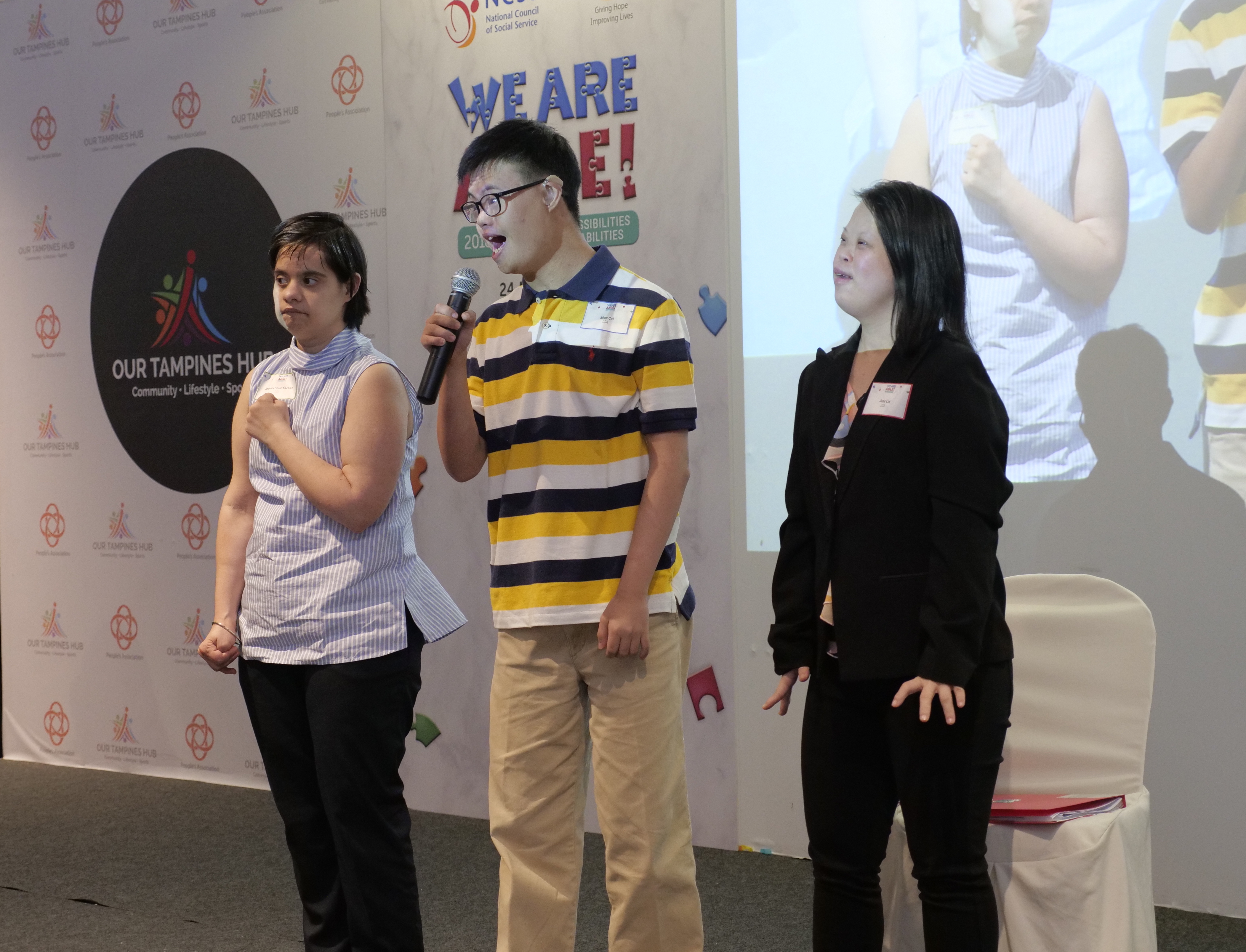
(L-R) Our Lives, Our Voices, Self-Advocates- Jaspreet Kaur Sekhon, Allan Cai, and June Lin
Three youth – Allan Cai, Jaspreet Kaur Sekhon and June Lin who went through training under this initiative went on stage to tell their stories and express their aspirations during this year’s celebration.
Allan, 19, graduated from Lee Kong Chian Garden School in 2016 and is currently working
as an Administrative Assistant at W.E. Social Enterprise. The self-proclaimed ‘Happiest Man On Earth’ joined MINDS & DSA’s joint Self-Advocacy project ‘Our Lives, Our Voices’ in August 2017.
He has since gone on to present a keynote speech with fellow Self-Advocates at the Having a Say Conference 2018 in Geelong, Australia. Having achieved his most recent milestone in planning the itinerary for holiday with friends and their families to Tokyo Disneyland, Allan continues to grow in confidence in charting his path towards the future. His hobbies include playing piano, drumming, aikido, singing, swimming, reading and playing computer games.
Jaspreet Kaur, 37, began her early education with MINDS’ Lee Kong Chian Gardens School,
before moving to Towner Gardens School. After completing her Kindergarten Teacher’s Aide Course, she then went on to work in a Kindergarten for 16 years. Currently, she works in a thrift shop 2 times a week. Jaspreet is an accomplished Public Speaker, and has been invited to speak at numerous events and even at the prestigious UN Conference on World Down Syndrome Day in 2014. Jaspreet joined the MINDS & DSA joint Self-Advocacy Project ‘Our Lives, Our Voices’ in August 2017, and has since presented a keynote presentation with her fellow Self- Advocates at the Having a Say Conference 2018 in Geelong, Australia.
From posing as a fashion model to dancing with her fusion dance group for state events, June is no stranger to the media. “I perform with my friends from DSA. Sometimes I get to perform with other
professional dancers. I like that very much. I love dancing.” The 33 year old lady takes life in her stride, working hard as an assistant restaurant service crew at Penang Culture whilst juggling her various commitments. June first joined ‘Our Lives, Our Voices’, a joint Self-Advocacy project MINDS & DSA in August 2017. From there, the confident Self-Advocate has since went on to give a keynote
presentation alongside her fellow Self-Advocates at the Having A Say Conference 2018 in Geelong Australia. Amidst her busy schedule, June also continues to bowl for the Singapore Special Olympics team, in which she won a Silver medal while representing Singapore at the 2015 Special Olympics, held in Los Angeles.
In the spirit of empowering individuals, the ‘voices’ of persons with disabilities themselves further took centre stage in another segment of this year’s event titled “Talking Disabilities”.
For the first time, a group of young adults with various disabilities planned and executed a segment of We Are Able! programme, based on a topic that matters to them. During this dialogue session young adults from the Disabled People’s Association, shared about their experiences living with a disability and their motivations for doing advocacy work.
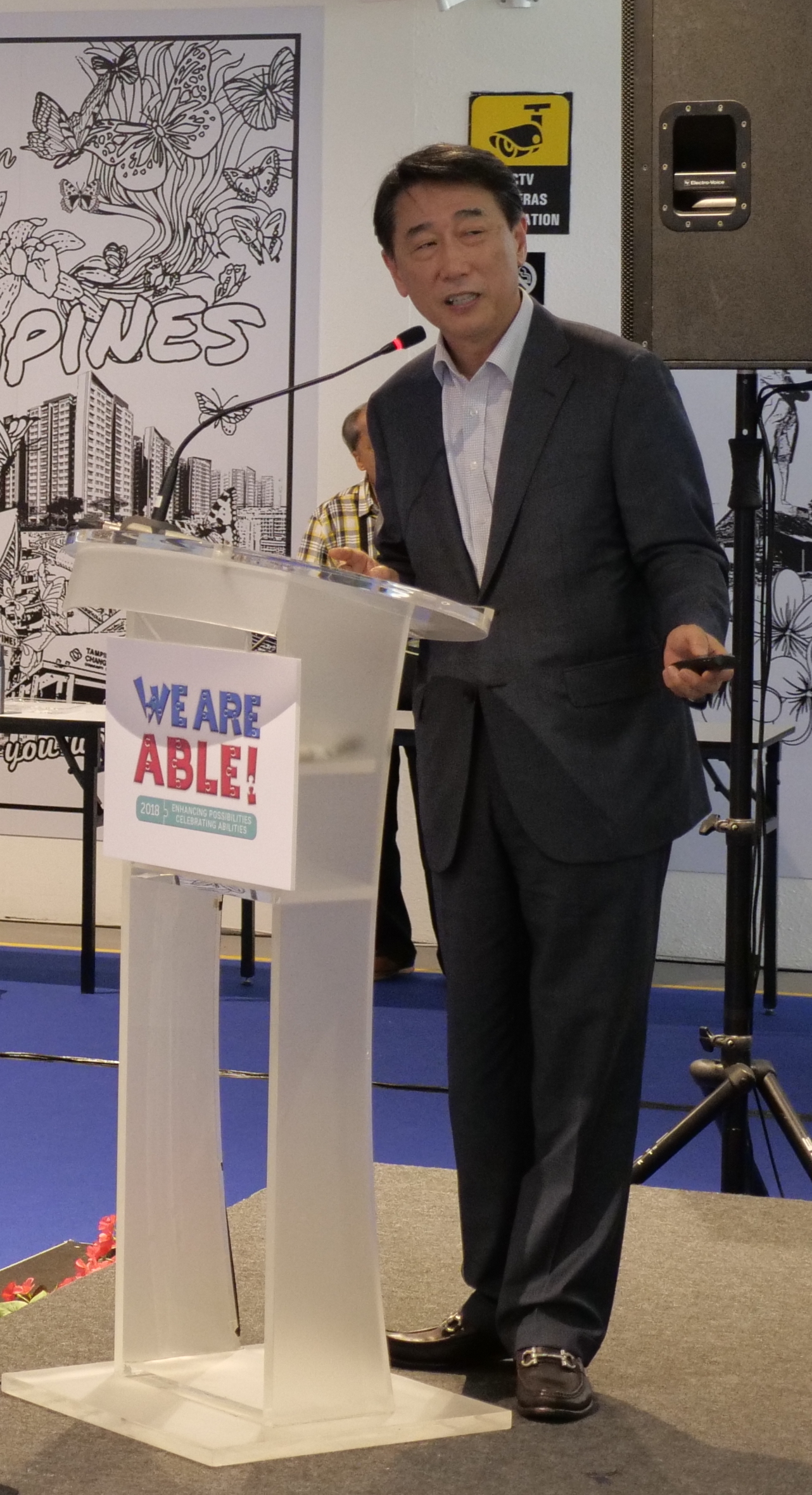
(Keynote Speaker, Professor Oh Joon addressing the audience at We Are Able! 2018)
Keynote speaker, Professor Oh Joon, former President of the Conference of States Parties of the United Nations Convention on the Rights of Persons with Disabilities (CRPD) and former South Korean ambassador to the United Nations said, “I am very impressed and encouraged that the government and people of Singapore give priority to promoting the rights of persons with disabilities and ensuring their full and equal participation in society. As Asia as whole is making fast progress in this area, I have great expectations for Singapore’s leading role in implementing the CRPD and enhancing the rights and welfare of all persons with disabilities.”
Professor Oh Joon, emphasised the social and rights-based apporach in promoting the rights of persons with disabilities as embodies in the Convention on the Rights of Persons with Disabilities (CPRD). Among many important achievements of the CRPD during the last 10 years, the Convention has contributed to changing our perspective, or shifting the paradigm, on the rights of persons with disabilities. More and more people now view persons with disabilities as full and equal members of society rather than as objects of charity, medical treatment or social protection.
The Convention is also the youngest and the only UN human rights instrument with an explicit sustainable development dimension. It has reaffirmed that all persons with all types of disabilities must enjoy all human rights and fundamental freedoms. In the Sustainable Development Goals (SDGx) adopted in September 2015, the rights of persons with disabilities are reflected on several goals as a cross-cutting issue. As the international community sets out to implement the SDGs, we should bear in mind that promoting the rights of persons with disabilities is critical for realising the overarching theme of the SDGs: leaving no one behind.
The Convention has mainstreamed civil society in the the global effort to promote and protect the rights of persons with disabilities. The CRPD was probably the first human rights convention nn the UN, in which creation civil society organisations played as important a role as the governments. Therefore, at every Conference of State Parties, civil society is well represented and makes great contribution both in formal meetings and side events.
He also specifically mentioned to focus on the importance of accessibility, which as a key principle of the CRPD, is fundamental and indispensable for overall protection and promotion of the rights of persons with disabilities.
He shared an interesting analogy: There was a big river between two villages somewhere in the world. But there was neither a bridge over the river, nor ferry service crossing the river. Therefore, only those who can swim were able to cross it and tell others how nice it is at the other side of the river. So, there were two groups of people, those who were able to cross the river and those who could not. One day, they built a bridge over the river, but it was quite a long bridge stretching over 1 mile. Now crossing the river depended on whether you can walk a long distance, and elderly or weak people still couldn’t do that. Then, they started shuttle bus services across the river. Now, the issue is whether you have bus fee in your pockets. This story illustrates what the CRPD preamble meant by the ‘interaction between persons with impairments and the barriers hindering their full participation in society.’ There are no absolute criteria for disability, and if we ensure more accessibility, fewer people will have disability.
The lack of equal access to the physical environment as well as information and communications is a form of discrimination. It also results in the lack of access to education, employment, health care services, political processes, development programs.
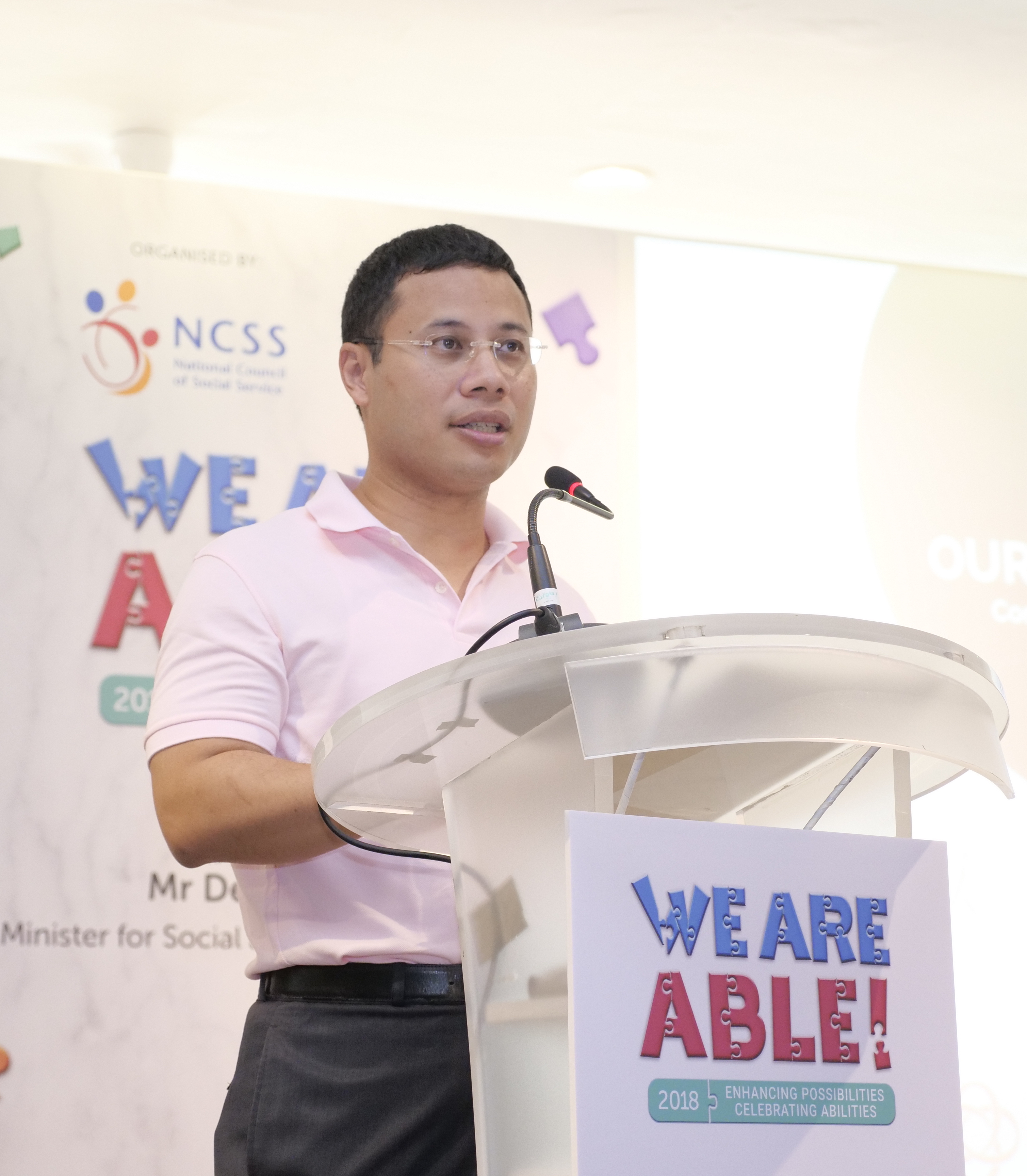
(Special Guest, Minister for Social and Family Development, Mr. Desmond Lee speaking at We Are Able! 2018)
Minister for Social and Family Development, Mr Desmond Lee said, “Today, we celebrate the contributions, big and small, that each and every one of you play to support persons with disabilities. Everyone is unique and special, but more importantly, everyone has something to contribute, to collectively build the inclusive society that we aspire to be.”
On Singapore’s Approach to the Rights of Persons with Disabilities,
Mr Desmond Lee said, “The first We Are Able! event was held in 2014, commemorating Singapore’s ratification of the United Nations Convention on the Rights of Persons with Disabilities in 2013. It signalled Singapore’s commitment to promoting and protecting the rights of persons with disabilities. But even before ratifying the UN Convention, we had already embarked on a national roadmap – our 5-year Enabling Masterplans – to build an inclusive society where persons with disabilities are recognised, empowered and given every opportunity to be integral and contributing members of society.”
He continued, “With the support and feedback of stakeholders, which include many of you, our first two Masterplans have strengthened support for persons with disabilities in the area of early intervention, education, employment, mobility and accessibility, healthcare and the use of assistive technology. We are investing about $400 million a year to roll out our initiatives for persons with disabilities. Under our third Masterplan, we will provide more support to caregivers of persons with disabilities, and we will work more closely with the community, schools and businesses to better integrate persons with disabilities in our workforce.”
On removing barriers:
He said, “In Singapore, there has been a collective effort over the years to enhance various types of accessibility. We have made improvements in the built environment, especially in our public transport system. But we are also making our schemes and programmes more accessible too.”
Access to Schemes:
“For example, my ministry, the Ministry of Social and Family Development has worked with the Ministry of Health to include the Client Assessment Form, or CAF, to support applications by caregivers of persons with intellectual disability (ID) or autism spectrum disorder (ASD) for the Foreign Domestic Worker Levy Concession or Grant. In the past, persons with disabilities or their caregivers applying for these schemes had to be evaluated via the Functional Assessment Report at general practitioners or hospitals on their Activities of Daily Living. But from April this year, CAF will allow them to be assessed at familiar environments such as Special Education schools where they are studying, or day activity centres where they are attending. Such convenience will make it even easier for applications by persons with ID and ASD and their caregivers. We estimate that about 1,000 persons with disabilities and their caregivers could benefit from this.”
Removing social barriers – a change in mind-set
“Beyond easing access to support and removing physical barriers, it is equally important to break down social barriers to inclusion. o Allow me to highlight some key areas of progress that Singapore has made in this regard over the years.”
Person-centred approach
“In 2016, NCSS completed the Quality of Life Study, which is a nationwide survey to ascertain the needs of persons with disabilities. The study found that seven out of 10 persons with disabilities would like to have greater independence in their lives. They do not wish to rely on others and want to contribute to their families and society. Yet, persons with disabilities also reflected through focus group discussions that the broader public view their differences as limitations and that “[persons with disability] need to be protected and treated differently from the rest in society”. Such a public attitude has, inadvertently, prevented persons from disability from achieving their aspirations and contributing more fully to society.”
“These findings highlight the fundamental need for social inclusion. The need for the public to see persons with disabilities not as mere recipients of help, but as persons with abilities and dreams for the future. To address these invisible attitudinal barriers, NCSS has embarked on a disability awareness public education campaign called “See The True Me”, supported by a five-year funding from Tote Board. The campaign encourages all of us to look beyond the disabilities and embrace persons with specials needs as persons first and foremost – persons with interests and hobbies; passion and dreams. As part of last year’s campaign, a young chef with mild intellectual disability was featured in The Straits Times, speaking about his dream of cooking for the President of Singapore.
“His words touched hearts and in less than two months, this 26-year-old young man, Mr Paul Simon, a graduate of the APSN Delta Senior School who works in Shangri-La’s Rasa Sentosa Resort and Spa, was invited by President Halimah to the Istana, where she enjoyed a three-course meal prepared by him. It was certainly a big moment for Paul and the special needs community. I hope many more persons with disabilities will be given the opportunities to fulfil their potential and realise their dreams.”
Ecosystem approach
“There is a proverb that says “It takes a whole village to raise a child”. In the context of helping individuals reach their full potential, equally important, is the help that the community and the entire ecosystem can provide. Under the Social Service Sector Strategic Thrusts, or 4ST , which is a 5- year social service roadmap, ‘non-traditional’ social service partners such as businesses and government agencies will be roped in to work towards social inclusion. On the employment front, SG Enable plays a crucial role. SG Enable was set up in 2013 to support persons with disabilities seeking employment and training opportunities, access to disability schemes and relevant services. In particular, SG Enable, with the government’s support, has been working closely with employers to help them build an inclusive company culture. Over the past year, my Ministry has worked closely with SG Enable to make progress on the Third Enabling Masterplan. SG Enable and SPD extended assistance to persons with acquired disabilities under the Hospital-to-Work programme by supporting their return from hospitalisation to work through reskilling, goal-setting and rehabilitation.”
“In addition, the School-to-Work Transition Programme, a joint initiative with the Ministry of Education, has also been extended to more special education schools. The programme offers more customised training pathways for students with diverse disability profiles so that they can successfully bridge the transition from school to work. Moving ahead, SG Enable will be setting up a Caregivers’ Space at the Enabling Village by the end of this year to strengthen the network of support for caregivers, a pertinent part of the social service ecosystem.”
“The Special Needs Trust Company, or SNTC will also be stepping up its outreach to caregivers to raise awareness on the care planning and financial education available to them. Over the next five years, SNTC will work with community partners including the 24 Social Service Offices island wide, to reach out to more than 1,700 caregivers of persons with disabilities.”
Cross Sector Collaboration
“Besides employment and caregivers’ support, there are also other meaningful cross-sector and community partnerships to look after the best interests of persons with disabilities. One good example is the Appropriate Adult Service. This scheme trains and deploys volunteers to help persons with mental and intellectual disabilities during police interviews, by facilitating communication. It involves a multiagency collaboration between the Singapore Police Force, the Central Narcotics Bureau, Agri-Food and Veterinary Authority of Singapore, NCSS and Movement for the Intellectually Disabled of Singapore or MINDS.”
“The service is available 24-7. It is heartening to know that 263 volunteers have stepped forward to be trained to help since the scheme began in 2013. There have been 464 activations since December 2015.”
Collaboration within the sector
“Within the sector itself, our social service professionals collectively known as the Social Service Tribe are also working hard every day to empower their service users and drive positive change. One good example is a new initiative called “Our Lives, Our Voice”, which we are launching today. The idea to work together to empower service users actually came from professionals working in two different NCSS member organisations – MINDS and Down Syndrome Association. Under this two-year project funded by NCSS, more than 70 persons with intellectual disabilities and developmental disabilities will be trained over 12 sessions to speak up about their own needs and be the “voices” for their community. You will also get to hear from young working adults from the Disabled People’s Association who will share about their experiences of living with a disability, as well as what motivated them to be voices for their peers in a dialogue session later at the event.”
“Today, we celebrate the contributions, big and small, that each and every one of you have made to support persons with disabilities.”
“Everyone of us is unique and special, but more importantly, everyone have something to contribute, to collectively build the inclusive society that we aspire to be. Let’s embrace diversity, so that our lives and our nation will be richer for it.” he closed.
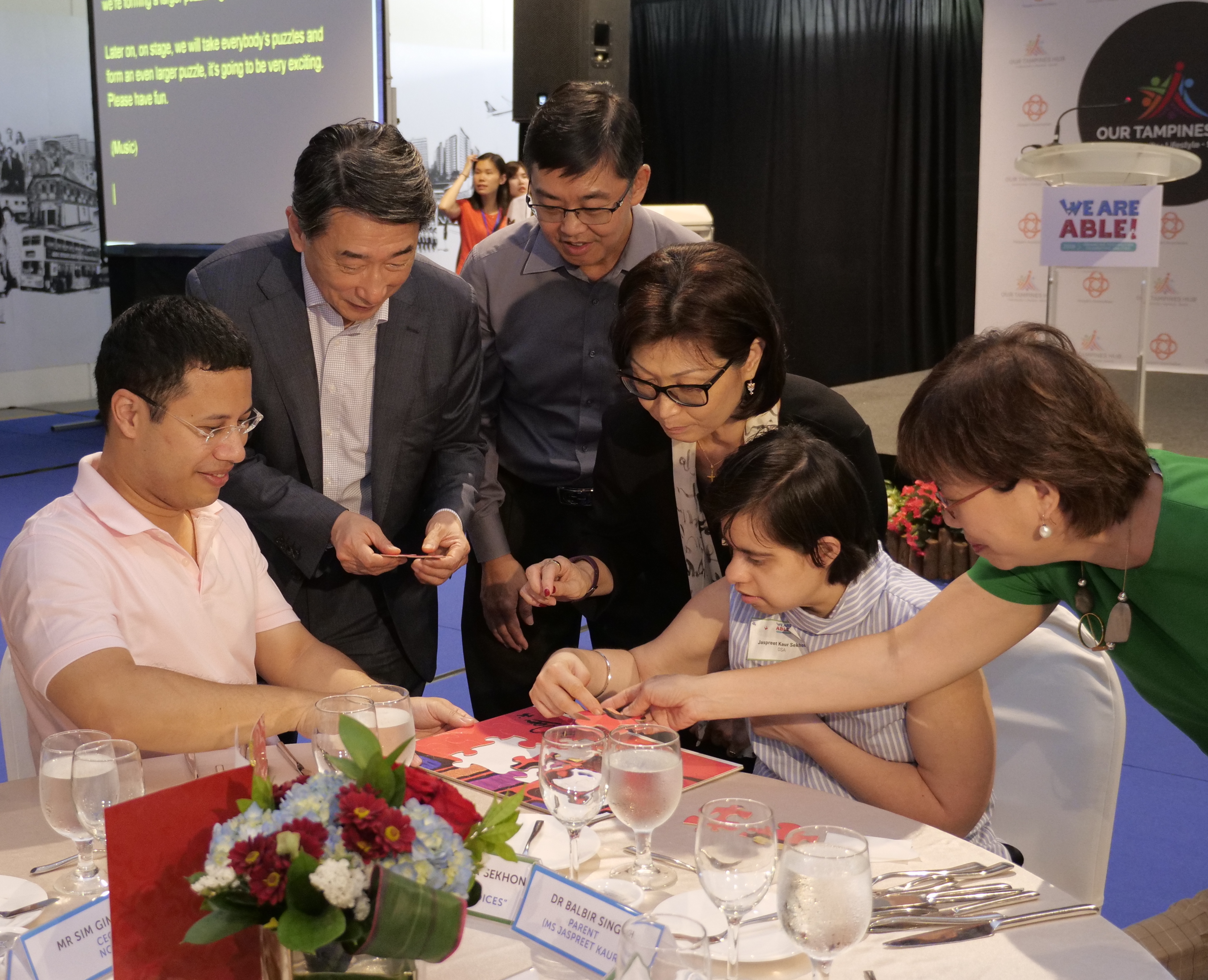
(L-R: Special Guest, MSF Minister Mr. Desmond Lee; Keynote Speaker Professor Oh Joon; NCSS CEO, Mr. Sim Gim Guan; NCSS Deputy CEO, Ms. Tina Hung; Our Lives, Our Voices Self Advocate, Ms. Jaspreet Kaur Sekhon; and Mayor, Central CDC, and President of Autism Resource Centre, Ms. Denise Phua, working together on a puzzle of uniquely shaped pieces to celebrate the abilities and contributions of persons with disabilities)
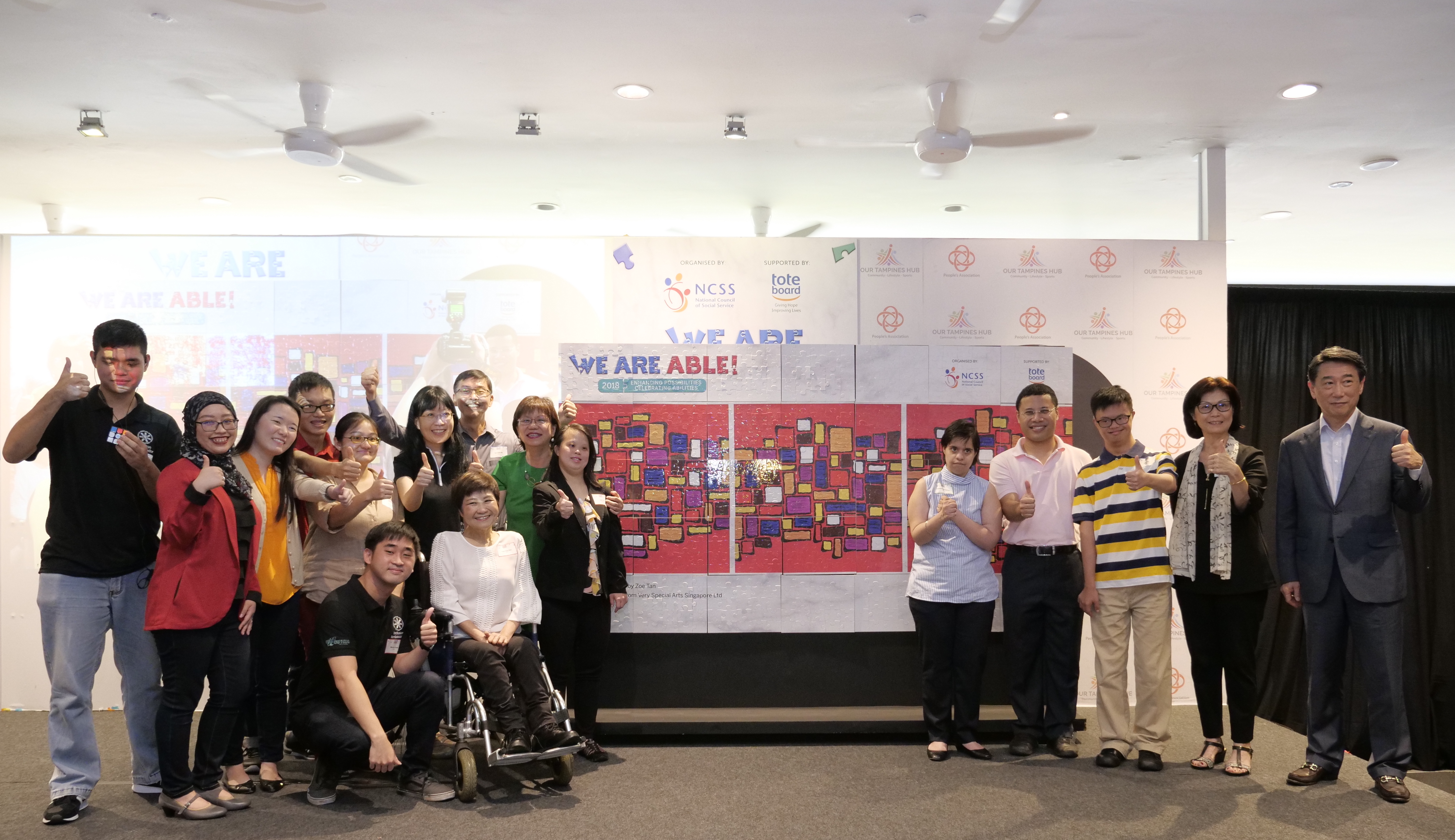
(The completed puzzle of uniquely shaped puzzle pieces presents a larger picture of a caring and inclusive society)
The vision and objectives of We Are Able! is aligned with the Social Service Sector Strategic Thrust (4ST), which calls for active participation and collaboration in the community so that everyone in the social service ecosystem plays a part to achieve the shared vision where “every person is empowered to live with dignity in a caring and inclusive society”.
NCSS will also continue to collaborate with social service organisations to pioneer initiatives and scale effective projects to enhance access to needed services. This will be done in tandem with the advocacy efforts with the See The True Me campaign to promote greater awareness and understanding of persons with disabilities among members of the public.
About National Council of Social Service
(NCSS) NCSS is the umbrella body for over 450-member social service organisations in Singapore. Its mission is to provide leadership and direction in enhancing the capabilities and capacity of our members, advocating for social service needs and strengthening strategic partnerships, for an effective social service ecosystem. Community Chest and Social Service Institute (SSI) are part of NCSS.
About Social Service Sector Strategic Thrusts (4ST)
The Social Service Sector Strategic Thrusts (4ST) is a 5 year roadmap for the sector, codeveloped by NCSS with stakeholders in the social service ecosystem – member organisations, service users, government, community, business leaders and civic-minded individuals. It is guided by a person-centred and holistic approach towards advancing the quality of life for individuals. The 4ST calls for active participation and collaboration so that everyone in the ecosystem plays a part to achieve a shared vision, where every person is empowered to live with dignity in a caring and inclusive society.
“Our Lives, Our Voices” is a MINDS-DSA(S) joint project that aims to develop persons with Intellectual Disabilities and Developmental Disabilities to be empowered as self-advocates. Three youths – Allan, Jaspreet and June who went through training under this initiative recently participated in the Having A Say Conference in Geelong Australia in Feb 2018.
Facts on Our Lives, Our Voices Programme:
It is a two-year pilot joint project of MINDS and DSA, funded by NCSS. It aims to
1. Improve the life and quality for persons with intellectual and development disabilities aged 16 years old and above.
2. Develop persons into leaders and “voices” for the community of Persons with Disabilities in agency, community and national efforts.
Background:
– Launched in August 2017
– Adopts Action Research methodology, and using various techniques such as speech and drama to train participants in crafting their own narratives about their needs, aspirations and in making sound decisions for themselves
– Each run of the programme is implemented over eight to 10 weeks
– Upon graduation, interested participants have the chance to lead an “Our Lives, Our Voices” self-advocacy group with the support of MINDS and DSA.
– Aims to develop the knowledge and abilities in 6 key facts:
1. Advocacy: Nurturing participants to grow into leaders and be self-advocates will give them the voice they need to participate and contribute their perspectives om matters that affect them at the community and national level
2. Choice: By developing a greater self-awareness of their emotions, needs and wants, participants will garner the strength to cope with their own challenges
3. Control and Autonomy: By being aware, and having the ability to know and exercise their rights and responsibilities as citizens and individuals, participants know what it is like to be independent and make sound decisions
4. Communication ability and respect: With a foundation in communication, public-speaking and peer-support skills, participants will not only be able to speak for themselves but also represent their peers on multiple levels.
Needs of the Programme:
– Studies have shown that general public lacks a concrete understanding of the abilities of persons with disabilities. The lack of which leads to overprotective behaviour that hinders them from fully exploring their abilities and lead independent lives.
– Substantial amount of research suggests that self-advocacy has significant benefits for persons with disabilities, and for their inclusion into the larger community.
– Self-advocacy training helps increase leadership capabilities, development of positive self-concepts, higher self-esteem and makes a heartening impact on families and communities.
– Aligns with our national vision of building an inclusive society.
Impact of the Programme
– Substantial amount of research suggests that self-advocacy has significant benefits for persons with disabilities, and for their inclusion into the larger community
– Increases leadership capabilities, development of positive self-concepts, higher self-esteem and makes a heartening impact on families and communities
– improves the overall quality of life of persons with intellectual and developmental disabilities
– Participants are more confident and aware of their own rights
– Their families are also more open to creating opportunities to harness the skills they learned in this programme
– Platform and initiatives such as We Are Able! Event focus on commemorating the unique abilities and achievements of persons with disabilities and raising awareness and understanding in the larger community
– Aligns with NCSS Strategic Thrusts (identifying and meeting social needs) and our national vision of building an inclusive society
Statistics
– Launch in August 2017
– Since launced, 2 cohorts have graduated from the programme
– Eight to 12 sessions for up to 18 participants, 1.5 hours per session depending on the participant’s learning capacity
– The first cohort has 13 participants, of which three of them are from MINDS
– The second cohort has 12 participants, of which 8 of them are from MINDS
Future of the Programme
– Provide intermittent progress report and updates to NCSS to evaluate on the traction of the programme


